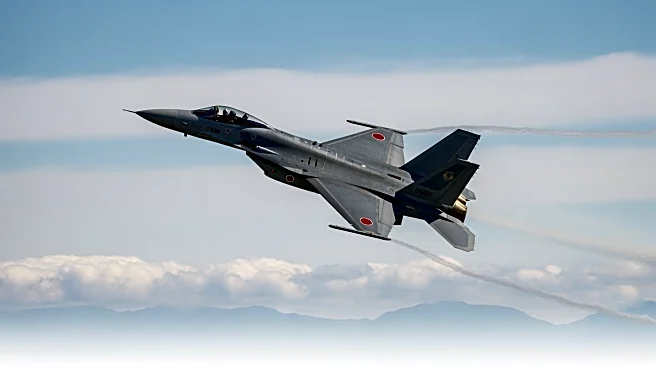What's Happening?
Japanese Prime Minister Sanae Takaichi, in her inaugural policy address, announced plans to expedite Japan's military buildup and increase defense spending. This decision comes in response to rising tensions with neighboring countries such as China, North
Korea, and Russia. Takaichi, who recently became Japan's first female leader, aims to achieve an annual military spending target of 2% of the country's GDP by March, ahead of the original 2027 schedule. She also plans to revise Japan's security strategy by the end of 2026, a move prompted by the changing global security environment, including Russia's invasion of Ukraine and ongoing conflicts in the Middle East. Takaichi's approach marks a significant shift in Japan's defense policy, traditionally characterized by a more pacifist stance.
Why It's Important?
The acceleration of Japan's defense spending and strategy revision reflects a broader shift in the country's approach to national security. This move could have significant implications for regional stability in East Asia, potentially escalating military tensions with neighboring countries. The decision to increase military capabilities may also influence Japan's diplomatic relations, particularly with China and North Korea, who may view these actions as provocative. Additionally, Takaichi's policies could impact Japan's domestic politics, as her government seeks to balance defense priorities with economic challenges such as rising prices and stagnant wages. The emphasis on defense spending may also affect Japan's economic relations with the United States, especially as President Trump is expected to push for increased Japanese purchases of American military equipment during his upcoming visit.
What's Next?
Prime Minister Takaichi is set to meet with President Trump during his visit to Tokyo from October 27-29, where discussions are expected to focus on strengthening the Japan-U.S. alliance. This meeting will be a critical diplomatic test for Takaichi, as she navigates demands for increased defense spending and military cooperation. Domestically, Takaichi's government will need to secure support from opposition parties to implement her defense policies, given her minority government's position. Additionally, Takaichi's stance on foreign workers and land purchases by foreigners, particularly from China, may lead to further policy developments aimed at addressing public concerns over national security and economic stability.
Beyond the Headlines
Takaichi's policies may signal a shift towards a more assertive Japanese foreign policy, potentially altering the balance of power in the Asia-Pacific region. Her hawkish views and past actions, such as visits to the controversial Yasukuni Shrine, could strain Japan's relations with neighboring countries, particularly China and South Korea. The focus on defense and security may also reflect broader global trends towards increased militarization and geopolitical competition. As Japan grapples with an aging population and labor shortages, Takaichi's approach to foreign workers and immigration could have long-term implications for the country's social and economic landscape.















